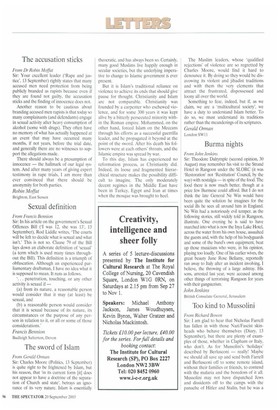The sword of Islam
From Gerald Orman Sir: Charles Moore (Politics, 13 September) is quite right to be frightened by Islam, but his reason, that 'in its current form [it] does not appear to have a doctrine of the separation of Church and state', betrays an ignorance of its very nature. Islam is essentially theocratic, and has always been so. Certainly, many good Muslims live happily enough in secular societies, but the underlying imperative to change to Islamic government is ever present.
But it is Islam's traditional reliance on violence to achieve its ends that should give pause for thought. Christianity and Islam are not comparable. Christianity was founded by a carpenter who eschewed violence, and for some 300 years it was kept alive by a bitterly persecuted minority within the Roman empire. Mohammed, on the other hand, forced Islam on the Meccans through his efforts as a successful guerrilla leader, and he propagated it beyond at the point of the sword. After his death his followers were at each others' throats, and the Islamic empire was spread by war.
To this day. Islam has experienced no reformation process, as Christianity did. Indeed, its loose and fragmented hierarchical structure makes the possibility difficult to imagine. The only moderately decent regimes in the Middle East have been in Turkey, Egypt and Iran at times when the mosque was brought to heel. The Muslim leaders, whose 'qualified rejections' of violence are so regretted by Charles Moore, would find it hard to denounce it. By doing so they would be disavowing its violent and jihadist traditions and with them the very elements that attract the frustrated, dispossessed and loony all over the world.
Something to fear, indeed, but if, as we claim, we are a 'multicultural society', we have a duty to understand Islam better. To do so, we must understand its traditions rather than the meanderings of its scriptures.
Gerald Orman
London SW11


















































































 Previous page
Previous page